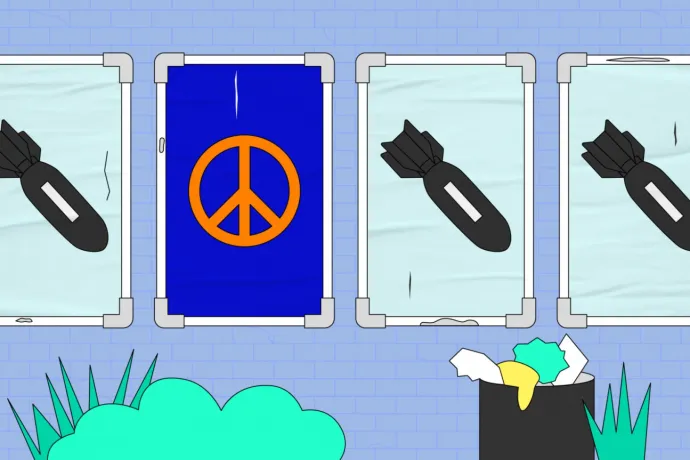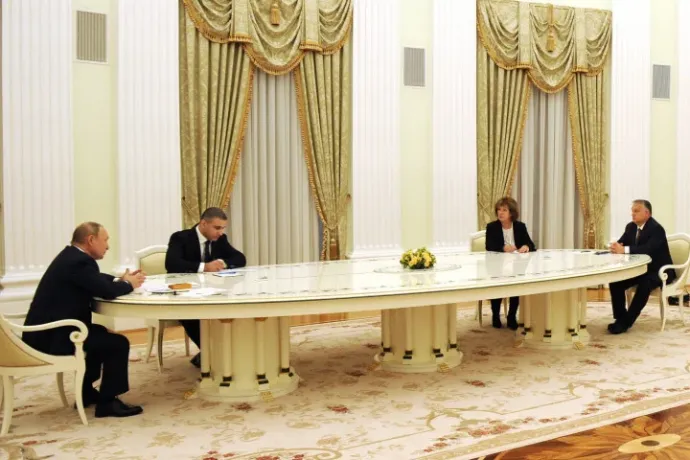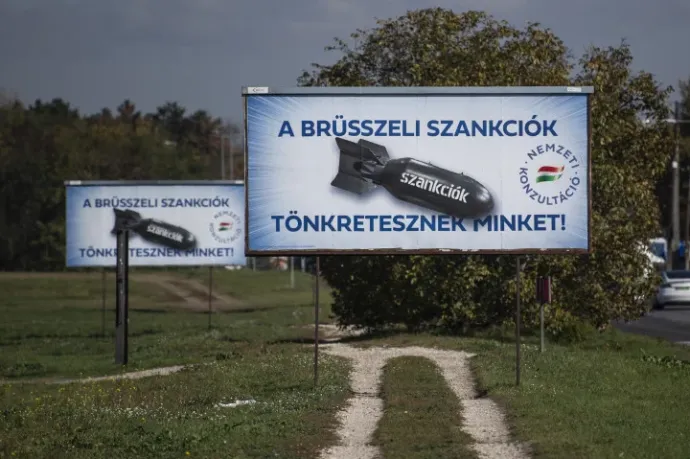
Hungary was on a communications rollercoaster in 2022. This is no coincidence, given that 2022 was an election year – the April election gave the Fidesz-KDNP coalition its fourth and strongest two-thirds majority ever. The governing parties started out with the slogan of "Hungary is moving forwards, not backwards" until overnight, they became the cabinet that would preserve the security and peace of Hungarians, and then by the end of the year they were "back in the fight" against the sanctioning Brusselites.
How did peace become the central message of the campaign, when previously, the government kept saying that there would be no war in Ukraine? And how did the government start "fighting Brussels" again, with the help of a national consultation and thousands of billboards depicting a bomb?
What Fidesz-KDNP politicians had already started to talk about at the end of 2021 was suddenly coming from everywhere at the beginning of 2022: “Hungary is going forwards, not backwards”. There were funny messages about it, there was even a song about it, which a minister played on the piano. Then came a change in world politics that – based on its messages at the time – neither the government, nor the governing parties were previously considering a serious possibility, and it transformed the campaign completely. The outbreak of the Russian-Ukrainian war also had a profound impact on the election campaign: in response to the war, Fidesz and the government completely transformed their communication.
Fidesz = peace, opposition = war
Fidesz, members of the government and the pro-government media were saying for a long time that there was little to no chance of a possible Russian-Ukrainian war. Of course, history has changed since then. At a conference in October, Orbán said that when he met Putin in Moscow in early February, he could tell there was trouble, he could tell there would be war. He claimed to have also gone to see NATO Secretary General Jens Stoltenberg, who confirmed that he had spoken to the Prime Minister after his visit to Moscow.
Although in hindsight, Orbán now claims that he had expected war, he did not talk about it at home during that time. In fact, the Hungarian government only really started to address the conflict in the last few days before the Russian invasion. While the US President was already talking about the Russians planning to invade Ukraine, the topic of the campaign in Hungary was entirely different.
When war actually did break out in our neighboring country on 24 February, it might have seemed for a few moments that Orbán and the Fidesz-KDNP coalition were not quite sure what to do with the new situation. In reality, however, the campaigning governing parties and the Prime Minister chose a clear, new message from the day the war broke out: “We must stay out of the war” and “We must maintain Hungary's security”. In addition to emphasizing order and preparedness, the government, which until then had campaigned against migrants, turned Hungary into a haven for Ukrainian refugees overnight.
Finally, by the first days of March, it had become clear that, alongside security, peace was becoming the central message in Fidesz's communication. Just four days after the war began, the first post on the subject appeared on Viktor Orbán's Facebook page, which was then used throughout the campaign, and was used to contrast them with the opposition in their communications for the next several months:
Hungary will not send weapons or soldiers to a war zone!
– the Prime Minister wrote on 28 February. On 4 March, Orbán himself said for the first time that the "left is on the side of war". After that, the government's campaign machinery started to regularly parrot the claim that the opposition parties would send soldiers to the war, which would drag Hungary into the Russian-Ukrainian conflict, and all Fidesz-KDNP candidates and government members were quick to repeat this on their social media platforms and at their campaign events.

As proof that the opposition wanted to send troops to Ukraine, the governing parties used a quote from prime minister-hopeful Péter Márki-Zay from an interview he had given to Partizán. "He is even prepared to send Hungarian soldiers to Ukraine in the event of a potential armed conflict", the public broadcaster's news reported.
The excerpt used was from an interview Márki-Zay gave before the outbreak of the war, in which he said that he believed that "Whatever NATO decides, all kinds of help and support for Ukraine within the framework of the alliance should be provided". This was followed by the question "even soldiers?", to which the opposition's candidate for prime minister said "If NATO decides so, even soldiers".
Following this, Márki-Zay repeated in vain several times that he did not want to send Hungarian soldiers to Ukraine – the government and the media empire close to it kept repeating that if the opposition won, they would send soldiers to Ukraine and drag Hungary into war. This was contrasted with the new message of peace from the government and Fidesz-KDNP. On April 3, the day of the election, the Prime Minister posted on his Facebook page: “The stakes of today's election: will Hungary stay out of the war or will it be dragged into it?”
From March, the well-established message was also accompanied by a nationwide campaign – both on billboards and in advertisements – entitled: "Let us preserve Hungary's peace". The ads that flooded Hungarian streets were not party-funded advertisements, but were "government information" and
were thus paid for using the taxpayers’ money.
The deluge of billboards, featuring Viktor Orbán's portrait and the slogan "Let's preserve Hungary's peace and security", popped up all around the country on 9 March. Once again, the posters were perfectly in line with Fidesz-KDNP's new central message that the opposition would lead Hungary to war. They then simplified the campaign to the point where all they said was: war = opposition, peace = Fidesz-KDNP.
It’s all Brussels’ fault
After another two-thirds victory, the summer period saw a more relaxed season, free of the government's signature, "blue-poster" communication. Finally, in the autumn, presumably in response to the growing crisis and the increasing discontent, the government started up its communication steamroller once again. This time the message was that "the misguided Brussels sanctions are destroying Hungary". On 28 September, it was announced that a national consultation on "the sanctions" would be launched, as if Viktor Orbán had nothing to do with them in the decision-making mechanism of the EU heads of state and government.
As always, the government encouraged the population through billboards to complete the national consultation questionnaire. This was preceded by an upsurge of statements and the usual repetitions of the Prime Minister's words, which were disseminated in a wide variety of test messages. Even so, when the winning design emerged, it surprised many. The anti-sanctions campaign reached a new level on 15 October, when the campaign received its visual support:
The billboards depicted "the failed Brussels sanctions" as an actual bomb.
The cover photo of the government's Facebook page was changed to the image of the billboard on 15 October, which the streets were flooded with a few days later. Even opponents of the sanctions said the government's posters perhaps went a bit too far when promoting the national consultation with the image, especially from a government that was supposed to guarantee peace in Hungary.
The last few months of the year were thus once again dominated by government officials – and Orbán himself – blaming everything on the 'failed Brussels sanctions'. According to the government, Europe is actually punishing itself with its sanctions policy, and not Russia.

The abolition of one of the most important measures of the government was also blamed on the sanctions. When Gergely Gulyás announced that the fuel price caps would be lifted within minutes of his statement, he blamed the EU oil sanctions, which at the time could not even have had a global market impact. Fidesz-member Károly Szita, the leader of the cities with county rights, even wrote a letter to Ursula von der Leyen asking the EU to change its sanctions policy.
Orbán's rhetoric of fighting – which, by the way, has been dominant for years prior to the election campaign in the spring – returned in full force in the autumn: government politicians were actually talking about being able to "force" a change in EU policy through a national consultation on sanctions.
Of course, blaming the EU and Brussels is nothing new in the Hungarian government's communication. 2022 showed that the governing parties will not budge on this issue, even when it comes to EU funds or access to the Recovery Fund. In all the campaigns of the past few years, the government has always “scourged” the EU and its institutions in its advertisements: the consultation on life after the 2021 pandemic was advertised with “Does Brussels make you angry?” billboards, and in 2019 the government put up billboards of the then head of the European Commission and George Soros, saying: “You have the right to know what Brussels is up to”.
The rolling dollars
While the government has blamed more and more problems – such as the lifting of the fuel price caps – on " the misguided Brussels sanctions", it is not easy to attack the Hungarian opposition with sanctions – other than the fact that opposition parties are "pro-sanctions" according to Fidesz and the government. Therefore, a whole new, hitherto unknown, set of words has been created for opposition parties which ran together in the spring elections:
"the dollar left".
This happened after Péter Márki-Zay, the opposition's candidate for prime minister, boasted in an interview that his movement had received hundreds of millions in support from the United States. It didn't take long for the state propaganda machine to jump on Márki-Zay's confession.
The term "dollar left" was first used by Gergely Gulyás, Minister at the Prime Minister's Office at a government press briefing in late September, and since then it has become one of the most repeated words by government officials and the pro-government media. Speaker of the House László Kövér was asked in a radio interview recently about "the rolling dollars", and pro-government news site Origo wrote that the recently appointed US ambassador was sent to Hungary to monitor the spending of the dollar left.
According to Fidesz, the fuel shortage which emerged right before the lifting of the fuel price caps was directly caused by the dollar left and the sanctions they are in favor of.
So after the last eight years of blaming everything on Soros, Gyurcsány, the migrants and Brussels, it looks like the next buzzword was discovered towards the end of 2022. The year thus ended in the shadow of the rolling dollars and the sanctions falling on the country like bombs – at least from the perspective of Fidesz and the government.
How long the currently used communication lines can be stretched out, remains to be seen. On 15 December of 2022, the national consultation, which had been extended due to low turnout also ended, but as it failed to produce reassuring answers to the economic problems, including rising energy and other prices, it is unlikely to bring an end to blaming the sanctions for everything.
The recent adoption of the ninth sanctions package – which Hungary has also agreed to in the end – shows that the EU has no plans to change its sanctions policy any time soon. Nor can we expect the Hungarian opposition to get rid of its new name, invented by Fidesz, in the coming months. Fidesz and its media are likely to continue to remind voters about the campaign contributions from the US for a long time to come.
For more quick, accurate and impartial news from and about Hungary, subscribe to the Telex English newsletter!